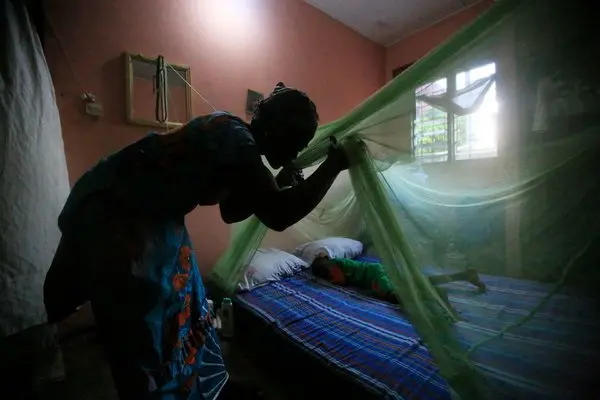According to the 2023 World Malaria Report, Nigeria accounts for 27% of global cases and 31% of malaria deaths, with an estimated 200,000 Nigerians—mostly children under five and pregnant women—dying each year.
In Lagos, Africa’s most populous city, malaria thrives off overcrowded communities, where poor drainage, stagnant water, and uncollected waste provide fertile breeding grounds for mosquitoes.
The midterm review of the Impact Project in Lagos has spurred fresh momentum for erasing the disease.
Federal and state authorities have pledged to accelerate progress by integrating Patent and Proprietary Medicine Vendors (informal drug sellers) and community pharmacies (local medicine outlets) into a regulated malaria service system.
To support this, a digitised reporting system now tracks data from community pharmacies and clinics in real time. This allows officials to identify service gaps, monitor supply chains, and strengthen accountability, helping to channel resources where they are needed the most.
But clinical interventions alone cannot defeat malaria. Communities must participate responsibly by removing mosquito breeding sites, testing early when symptoms appear and trusting formal healthcare systems.
Climate change complications
Rising temperatures and shifting rainfall patterns caused by climate change are prolonging mosquito breeding seasons. Flooding in Lagos creates stagnant pools that sustain mosquito populations year-round. Once thought to be a largely rural disease, studies show that malaria is now spreading in urban areas.
Curbing it, therefore, must go hand in hand with climate adaptation policies such as improved drainage systems, sustainable urban planning and proper waste management.
Why Lagos matter
With over 17 million residents, Lagos offers a potential blueprint for other states. Its use of evidence-driven planning, digital tools and private sector partnerships shows a shift towards technology-backed control—away from the donor-driven campaigns of the past.
The urgency of malaria elimination exceeds reducing mortality. A World Bank study estimates that Africa loses $12 billion annually in productivity due to the disease.
In Nigeria, families bear steep treatment costs, children miss school, and workers lose productive hours, deepening cycles of poverty.
Triumph against malaria
Eliminating malaria would therefore bring about economic relief for households, improved child survival rates, and stronger national productivity.
Winning the fight will require more than distributing bed nets or spraying insecticides. Success depends on making prevention and treatment both accessible and accountable, while tackling the environmental conditions that allow the disease to persist.
Notwithstanding, Lagos’ evolving strategy offers that Nigeria can turn the tide against one of its most persistent killers.
The 2023 World Malaria Report highlights Nigeria's severe malaria burden, with the country contributing to 27% of global cases and 31% of deaths, particularly affecting children under five and pregnant women. Lagos, Africa's most populous city, faces significant challenges with its overcrowded areas, poor drainage, and uncollected waste creating ideal mosquito breeding conditions. In response, federal and state authorities are integrating informal drug sellers into a regulated malaria service system supported by a digitized reporting system to address service gaps and improve resource allocation.
Climate change exacerbates the issue by extending mosquito breeding seasons through higher temperatures and increased flooding, necessitating climate adaptation strategies like better drainage, urban planning, and waste management. Lagos's approach, using evidence-driven planning, digital tools, and private sector partnerships, serves as a potential model for other regions. Beyond health impacts, malaria inflicts significant economic costs, with Nigeria losing productivity and families facing expensive treatments due to the disease.
Eliminating malaria could thus enhance economic productivity, improve child survival rates, and reduce poverty cycles. Comprehensive measures, including accessible and accountable prevention and treatment, alongside addressing environmental conditions favoring malaria, are vital. Lagos's strategy demonstrates potential to significantly mitigate malaria, presenting a path forward for Nigeria to combat this persistent public health challenge.






